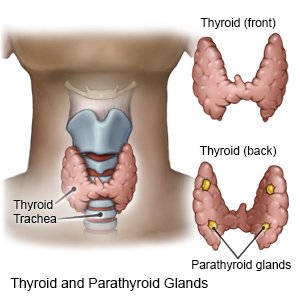Hyperthyroidism
Medically reviewed by Drugs.com. Last updated on Aug 4, 2025.
Hyperthyroidism is a condition that develops when your thyroid hormone levels are high. Thyroid hormones help control body temperature, heart rate, growth, and weight.
 |
DISCHARGE INSTRUCTIONS:
Call 911 for any of the following:
- You have sudden chest pain or shortness of breath.
- You have a seizure.
- Your heart is beating faster than usual.
- You feel like you are going to faint.
Contact your healthcare provider if:
- You have a fever.
- You feel nervous and restless.
- You have chills, a cough, or feel weak and achy.
- You run out of medicine or have stopped taking it.
- You have questions or concerns about your condition or care.
Related medications
Treatment options
The following list of medications are related to or used in the treatment of this condition.
Medicines:
- Antithyroid medicines decrease thyroid hormone levels and your symptoms.
- Take your medicine as directed. Contact your healthcare provider if you think your medicine is not helping or if you have side effects. Tell your provider if you are allergic to any medicine. Keep a list of the medicines, vitamins, and herbs you take. Include the amounts, and when and why you take them. Bring the list or the pill bottles to follow-up visits. Carry your medicine list with you in case of an emergency.
Rest as directed:
You many need to avoid stressful and heavy physical activities. Slowly start to do more each day. Return to your daily activities as directed.
Nutrition:
You may need to eat more to give your body the extra energy it needs. Foods high in protein will help prevent weight loss. Ask your healthcare provider which foods are best for you.
Follow up with your healthcare provider as directed:
You may need to return for more blood tests to check your thyroid hormone level. This will show if you are getting the right amount of medicine. Do not stop taking your medicines without talking to your healthcare provider first. Write down your questions so you remember to ask them during your visits.
© Copyright Merative 2025 Information is for End User's use only and may not be sold, redistributed or otherwise used for commercial purposes.
The above information is an educational aid only. It is not intended as medical advice for individual conditions or treatments. Talk to your doctor, nurse or pharmacist before following any medical regimen to see if it is safe and effective for you.
Learn more about Hyperthyroidism
Treatment options
Care guides
Symptoms and treatments
Further information
Always consult your healthcare provider to ensure the information displayed on this page applies to your personal circumstances.
